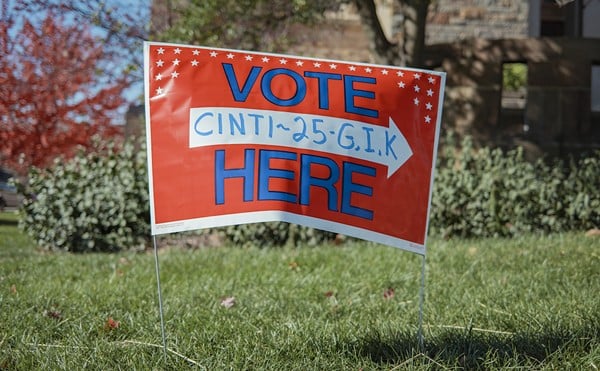If the Cincinnati Arts Association (CAA) is worried about finding performers to fill its venues because of the civil rights boycott, the group can turn to its own lawyer, Edward Marks, a capable entertainer.
Melodrama is Marks' specialty. In arguments justifying the CAA's lawsuit against members of the Coalition for a Just Cincinnati, he compared the boycott to political violence against civilians. Marks filed a brief in Hamilton County Common Pleas Court, opposing dismissal of the suit.
"Let us draw a parallel to the Middle East," he wrote. "Let us assume that a group of six people in Cincinnati are irate because they believe an unproven (and doubtless unprovable) 'fact' that all Palestinians would like to become suicide bombers and kill all the Israelis. However, rather than going to Israel to fight their battle there, they simply go to the nursery school down the street (in Cincinnati) and beat up on innocent 4-year-olds. There is no valid social purpose to be served either by attacking innocent children — or by attacking innocent entertainment venues."
The CAA seeks more than $586,000 for lost revenue, advertising expenses and other damages it says it incurred when Bill Cosby, Whoopi Goldberg and other performers canceled their shows.
The defendants are the Rev. James W. Jones, Amanda Mayes, the Rev. Stephen Scott, Michelle Taylor-Mitchell, Linda Newman, the Rev. Donald Sherman and John or Jane Does 1 through 20.
The six named defendants have been active in the Coalition for a Just Cincinnati, one of several groups pressing a human rights boycott of the city.
Judge Thomas Nurre heard oral arguments July 25 on the defendants' motion to dismiss the suit.
The CAA is a private, non-profit corporation independent of any government, according to Marks. The boycotters have acknowledged they have "no beef" with the CAA, he said. The boycott has caused damage to CAA without justification, Marks said.
"To speak freely in America is a right which has a price tag," he said. "That's what the First Amendment means: if you say something, you stand for the results of it."
Marks said the CAA has unsuccessfully tried to get the defendants to meet to negotiate.
"So we're innocent and they won't deal with us," he said.
But the six named defendants met once with the CAA, at Cosby's request — only to be sued as a result, according to their attorney, Lucian Bernard.
"Dr. Cosby asked these defendants to meet with the Arts Association to see if some discussion might find some common ground," Bernard said.
The six boycotters had decided against meeting, but decided to attend because they thought it would be rude not to, according to Taylor-Mitchell. The CAA offered nothing, she said; and when the coalition informed Cosby, he cancelled his performance.
The CAA lawsuit doesn't lend itself to mediation or a settlement, because the boycotters believe they are acting within their rights, according to Newman, a co-chair of the Coalition for a Just Cincinnati. The First Amendment isn't up for negotiation, she said.
"I feel that where there are constitutional issues, there's no halfway ground," Newman said.
The coalition has filed a lawsuit in federal court, saying the CAA's suit is an effort to squelch boycotters' First Amendment rights.
The Artists of Conscience Campaign is an effort of the Coalition for a Just Cincinnati. The Cincinnati Black United Front has called for economic sanctions against the city. Stonewall Cincinnati has called for a travel and tourism boycott of the city.
"If you think the boycott's going to quit because of this frivolous lawsuit, you've got another thing coming," Scott said.
Taylor-Mitchell said the CAA's lawsuit is a "scare tactic," but says she won't be deterred.
"I'm not out here every day in vain," she said. "And if it doesn't directly benefit me, it will my 12 grandchildren."
The CAA has demanded the names of members and supporters of the Coalition for a Just Cincinnati.
"They want to know everyone who's involved, who the membership and members are," said defense attorney Lucian Bernard.
Even if the CAA were able to muscle the six defendants named in the suit, there will probably be 25 more people who come forward and do the same things, Bernard said.
Although the CAA is a private organization, its major clients are government-owned. The CAA manages the Aronoff Center, owned by the state of Ohio; Memorial Hall, owned by Hamilton County; and Music Hall, owned by the city of Cincinnati.
Nurre said he would rule later on the motion to dismiss the suit. He also delayed the start of pre-trial discovery — the process of deposing witnesses and turning over documents and other evidence required to prosecute or defend against a lawsuit. ©





